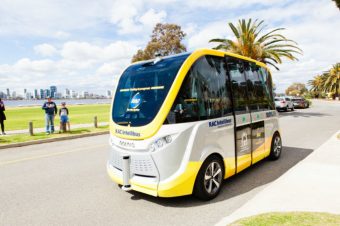Driverless vehicle technology is likely to be extended in Australia and to New Zealand and South East Asia.
Further deployments of autonomous vehicle technology may be facilitated through the Royal Automobile Club (RAC) expanding its partnership with Navya, the French designer/manufacturer of the driverless RAC Intellibus,
The electric Intellibus is being trialled in South Perth, Western Australia.
The partnership will deliver expertise and knowledge of autonomous vehicle systems and technology to help establish more trials, and will also increase opportunities for further innovation and community engagement, RAC Group chief executive officer Terry Agnew says.

“This exciting collaboration will see RAC coordinate the on-site commissioning of Navya vehicles in Australia, New Zealand, parts of South East Asia and Japan as well as providing a range of technical support services,” Agnew says..
“We are also focussed on continuing to put automated technology to the test to help save lives and stop serious injuries on our roads, with human error estimated to cause around 90% of road crashes.
“With Navya autonomous vehicles being fully electric, this partnership also supports the development of environmentally sustainable transport options into the future.”
Navya chief executive officer Christophe Sapet says the partnership will help ensure more people can experience automated vehicles and will support the fast-paced growth and global reach of Navya’s vehicle fleet.
In an Australian first, RAC, with the support of the Western Australia State Government, launched the RAC Intellibus in South Perth in August 2016, with more than 7000 people registering to take part in the trial so far. The driverless, electric shuttle is designed to complement the existing public transport network by transporting passengers across the first and last 1.6km.
“Ultimately our aim is to increase the understanding of how driverless vehicles can be integrated in to our transport system, and how they could best benefit the community,” Agnew says.
“We’re continuing our own trials in WA, also contributing to a number of national working groups and research initiatives, and assisting with the development of policy to help ensure Australia is ready for the inevitable arrival of driverless vehicles.”
Agnew says the more government, industry and the public learn about and engage with driverless vehicles “the more prepared we will be to transition them on to our roads”.







